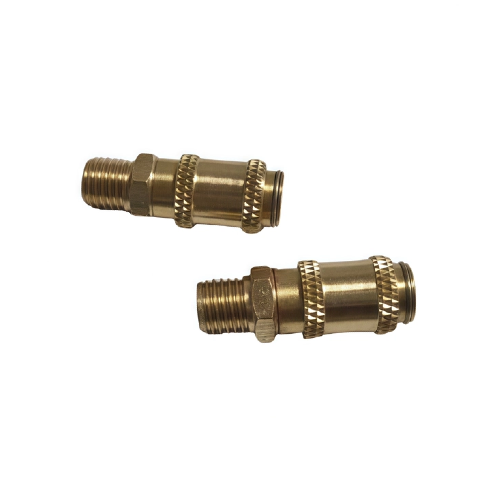close
Choose Your Site
Global
Social Media


Views: 0 Author: Site Editor Publish Time: 2025-07-07 Origin: Site










Precision and speed are non-negotiable on a molding floor where equipment runs nonstop and downtime means lost revenue. A well-designed quick coupler simplifies mold cooling circuit changes by enabling fast, secure, and leak-proof connections. For manufacturers seeking both durability and thermal efficiency, the brass quick coupler stands out as a trusted solution. Its corrosion resistance, excellent heat conductivity, and fatigue strength make it an ideal fit for high-frequency operations involving repeated installations and removals.
In mold cooling systems, water or other cooling media flow constantly through the circuit. This continuous exposure to moisture makes corrosion resistance a critical factor. Brass offers natural resistance to corrosion, especially when compared to materials like aluminum or untreated steel. Additionally, brass’s high thermal conductivity allows it to transfer heat more efficiently than stainless steel, aiding the overall cooling performance and extending the lifespan of your equipment.
Mold systems often require frequent disconnection and reconnection, whether for maintenance or product changeovers. In such applications, material fatigue becomes a serious concern. Brass has an excellent fatigue resistance profile—it maintains structural strength even after thousands of connection cycles. While stainless steel may seem tougher at first glance, brass often outperforms it in long-term repeated-use environments, resisting cracks and material stress under typical quick coupling operations.
From a production standpoint, brass is easier to cast and machine than stainless steel. This allows for intricate internal valve designs and smooth bore finishes that ensure better flow rates and seal integrity. At the same time, brass provides an ideal balance between performance and cost, giving manufacturers and maintenance engineers a solution that meets both technical and budgetary requirements.
One of the most appreciated features of a quick coupler is the ability to connect and disconnect cooling lines without tools. This speeds up mold changeovers and reduces labor effort. A well-designed brass quick coupler ensures a secure and tight fit with a simple push-and-click mechanism, making it ideal for fast-paced production environments where efficiency is non-negotiable.
Another essential feature is the internal shut-off valve built into many quick couplers. When disconnected, the valve automatically seals the flow path, preventing coolant leakage. This keeps the work environment clean and reduces the risk of equipment corrosion, slip hazards, and wasted coolant fluid. For systems using multiple cooling circuits, this leak-prevention design is especially beneficial, minimizing downtime and cleanup efforts.
Every mold setup is different, and sometimes space constraints make a straight-line connection impractical. Brass quick couplers are available in multiple configurations—straight, 45-degree, and 90-degree bends—allowing you to route your cooling lines in the most efficient way. This flexibility ensures optimal flow without stressing the hose connections, contributing to longer system life and reduced maintenance.

Not all quick couplers are created equal. Depending on your system’s pressure and operating temperature, you’ll need to choose a brass coupler rated to handle those conditions. A mismatch in rating can lead to leaks, valve failures, or even system shutdowns. Always consult the product specifications to ensure your coupler meets or exceeds your system's requirements.
The sealing element is just as critical as the coupler body. For mold cooling applications, silicone seals offer good flexibility and heat resistance, making them ideal for general use. However, Viton (fluoroelastomer) seals provide superior chemical resistance and perform better under high temperatures. If your application involves aggressive fluids or elevated thermal loads, Viton is often the better choice.
A key consideration in mold environments with international equipment is standard compatibility. Brass quick couplers should match ISO or other globally recognized standards, ensuring the male and female halves are fully compatible. Using mismatched connectors from different standards can lead to improper sealing or equipment damage. Always verify compatibility before ordering or installing.
Threaded couplers are common in mold setups, and using trapezoidal threads reduces the chance of cross-threading during installation. This design guides the fitting into place more naturally and prevents thread damage, especially under repeated use. For technicians in high-turnover environments, this feature saves time and frustration.
To maintain performance and prevent leaks, it’s essential to inspect the O-ring or seal regularly. Over time, seals can harden or accumulate residue from coolant additives. Cleaning the coupler and replacing worn O-rings during scheduled maintenance keeps your system operating at peak performance. You can also use de-scaling solutions periodically to remove buildup inside the coupler that may restrict flow.
Even the best systems may occasionally develop leaks. Minor dripping, especially during disconnection, can result from worn seals or internal debris. If you notice moisture around a disconnected coupler, check for hairline cracks, O-ring wear, or contamination inside the valve. Replacing worn parts promptly avoids larger issues down the line. These practical insights—often shared among experienced users—help ensure your quick coupler system runs reliably.
From efficient cooling performance to easy installation and long-term reliability, the quick coupler proves itself to be a critical component in any mold cooling system. When constructed from brass, it delivers even more value—resisting corrosion, tolerating thermal stress, and performing reliably through countless connections. Whether you're optimizing an existing system or setting up a new line, choosing the right brass quick coupler makes a measurable difference in uptime and efficiency.
Dongguan Tianying Mold Fitting Limited has been specializing in mold cooling accessories like quick couplers since 2005. With nearly two decades of manufacturing expertise and a complete supply chain, we offer top-quality products compatible with international standards and tested for durability. For any inquiries or custom orders, contact us today and let our professional team help you find the right solution for your molding needs.